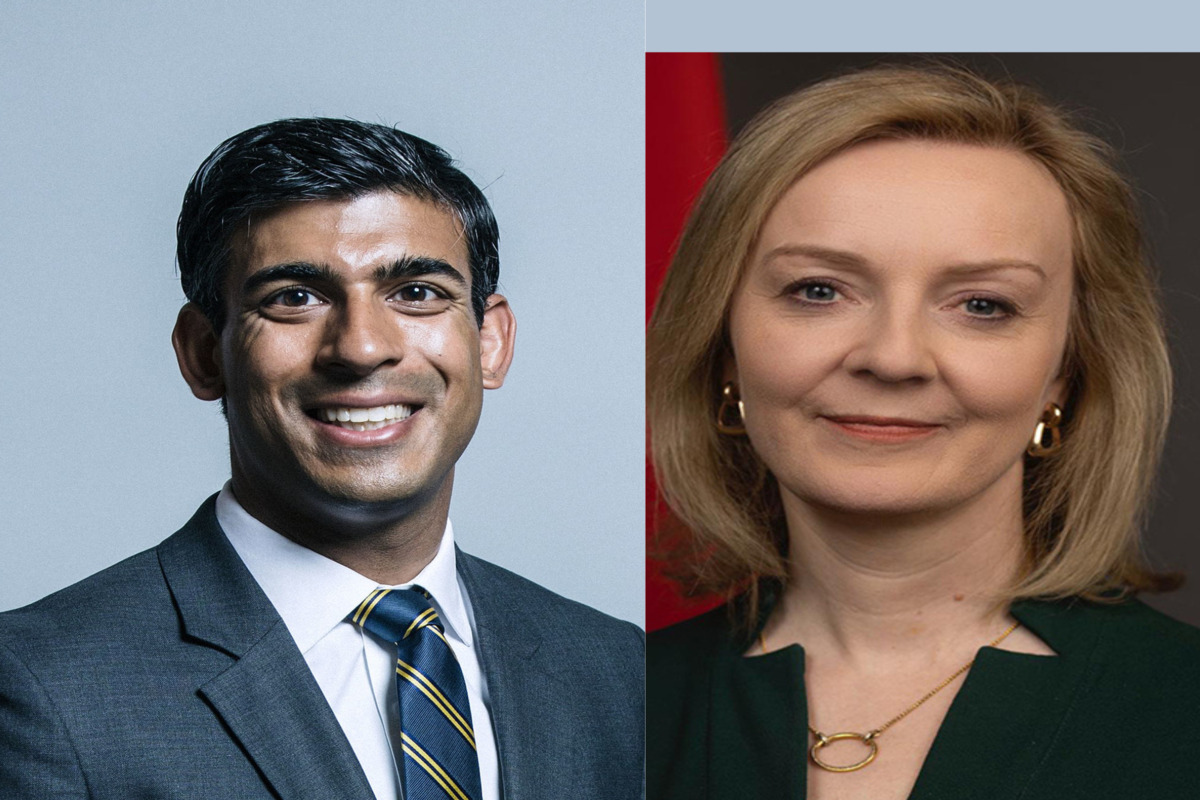August is the month of Rakhi festivities when Rishi Sunak, like a practising Hindu faithful, is seen wearing a reddish-yellow wrist band, in hot pursuit of supporters in his campaign to become the next Prime Minister of the United Kingdom. He is up against redoubtable Ms Liz Truss for the country’s top post in the run-up to September 5 decision day when one of them will be declared victor.
Politically both strong Tory faithful and staunch followers of the old ‘Iron Lady’ Margaret Thatcher, they are dyed in wool blue on blue fighters. Both have two daughters, the youngsters mostly keeping away from limelight though recently one of Liz Truss daughters has been spotted on the campaign trail. Liz Truss, the current Foreign Secretary, and Sunak the former Chancellor of the Exchequer, have no love lost between them at the moment.
Advertisement
Sunak has been widely accused of stabbing Liz Truss in the back over the timing of his resignation last month from Prime Minister Boris Johnson’s government in the alleged hope of himself becoming prime minister. He has denied the allegation, citing fresh policy differences rather than ambition. But the back ‘stabbing’ or disloyalty allegation refuses to go away.
Joining the battle in support of Liz Truss, current Chancellor Nadhim Zahawi, who replaced Sunak, has accused Sunak of behaving like a “doomster” in contrast to the “booster” image of Liz Truss. Clearly the knives are out and the scene is getting uglier.
Sunak who carries the image of a hardline economist has softened his stand in recent days by saying that he would cut basic rate of income tax from 20 percent to 16 percent by the end of next parliament. But the voters want tax cuts now, not later. Supporters of Liz Truss have accused Sunak of belatedly trying to rebrand himself as a tax cutter. Voters still remember him as the man who raised National Insurance and corporation tax while at the Treasury.
Last week Liz Truss appeared to have made a faux pas by saying she would bring pay scales in the country in line with the regional costs rather than giving everybody London rates, but she backtracked quickly saying she was only making a “general point”. Her supporter, Penny Mordaunt, erstwhile rival who had thrown her hat in the ring in the leadership race, said it was a misinterpretation of what Liz Truss said.
Another Liz Truss backer and a former cabinet minister, Sir John Redwood, accused Sunak of flip-flopping. “Rishi now wants the state to spend and borrow more to help with the cost of living,” adding “Mr Flip Flop will discover the more you change your message the fewer people will believe anything you say. He told us if the state borrowed more we would get more inflation so he wouldn’t do that.”
Sources close to Liz Truss said she had not ruled out a further financial package for vulnerable families, though no announcement had been made yet. “Of course she would keep it under review,” they said.
Wading into choppy waters, former Labour Prime Minister Gordon Brown urged both candidates to agree an emergency budget with Boris Johnson this week or risk” condemning millions of vulnerable and blameless children and pensioners to a winter of dire poverty.” Writing in the London Observer, Brown warned:” The reality is grim and undeniable: a financial time bomb will explode for families in October as a second round of fuel price rises in six months sends shock waves through every household and pushes millions over the edge.”
More than half of the public thinks that the government can do more but is choosing not to do, according to opinion pollster Public First which found that 64 percent people were finding it “difficult or impossible” to pay energy bills. A former minister and Sunak supporter, Damian Hinds, conceded that the package drawn by Sunak when he was chancellor was “not enough in these extraordinarily difficult times.” But Sunak is ready to do the needful if elected Prime Minister, said Hinds.
Sunak attacked Liz Truss for putting tax cuts before other measures to help families cope with higher bills. He insisted: “Inflation is the single most pressing economic challenge that we face. It makes people poorer, and it could lead to a scale of hardship for people in this country that we haven’t seen in decades.” Putting tax cuts before tackling inflation would be “grossly irresponsible,” he said.
But as things stand in the prevailing public mood, a lot of people want tax cuts today, not jam tomorrow. Both sides, however, are ignoring the missing prize in the Ukraine war which is driving them towards an ever harder collision. A United Nations-brokered ceasefire can give peace a chance for economic recovery and avoid the looming recession for both Tory camps.
Subhash Chopra is a freelance journalist and author.











